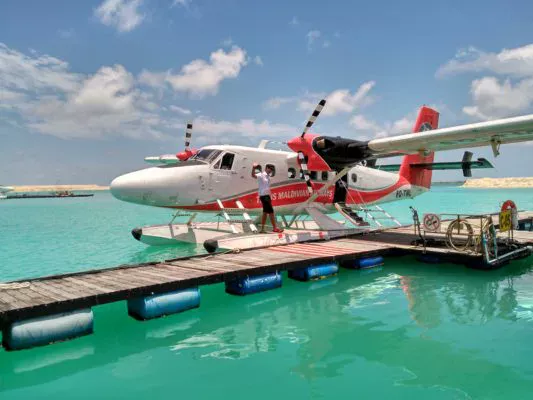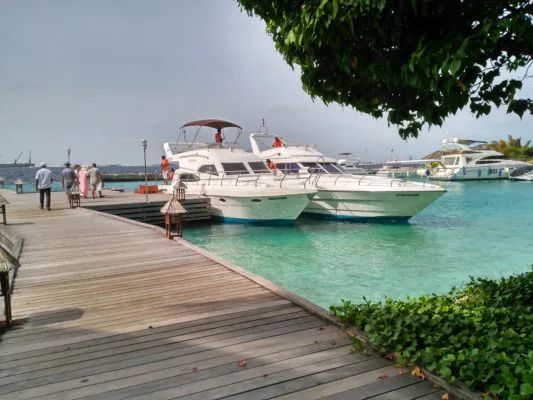11 Things to Know Before Traveling to the Maldives (…and How to Deal With Them)
1. Entry
The entry is relatively smooth – if you follow certain rules. Alcohol, Buddha statues, crucifixes, magazines with scantily clad ladies, pork products, etc. should be left at home to avoid trouble and long waiting times. A visa valid for 30 days can be obtained directly at the airport. After you have your suitcases, you enter the arrival hall where a representative of the booked island or tour operator is waiting for you. Since the boats and the seaplane usually have to wait for other passengers as well, there may be some waiting time at the airport.
Therefore, do not expect that it goes on immediately and instead, already enjoy the view of Malé, the great yachts and the turquoise blue water. For hungry there is at the airport eg: a Burger King in which you can bridge the waiting time.
2. Seaplane
With flights that land on time by 3:15 pm, you can still reach the seaplane comfortably and without stress. For later arrivals, an overnight stay in Malé or Hulhumalé may have to be booked. In this case you will start with the first seaplane the next morning. There are seaplanes that take off no later than 17:00, but you should not speculate on this. Seaplanes fly on sight and therefore need good light and halfway good weather conditions.
Therefore: pay attention to this when booking a flight. Flights that land early in Malé and take off late are good. With late departures, the chances are better to still reach the international scheduled flight in bad weather.
3. Weather
As a rule, the best time to travel is December, January, February, March and April – the rest of the year is more or less rainy season. My rule is: in the winter months you have more chances for sun than in the other months. Sayings like “in the rainy season it rains for half an hour and then the sun comes out again” or “it only rains at night” – you can save yourself. In my year on the Maldives it rained the last week of April and the first two weeks of May. In November, a cyclone hit the Maldives, causing a series of seaplanes to be grounded for days. This is unfortunately the uncomfortable truth.
Therefore, don’t get crazy about the weather. It will be as it will be. Be prepared for a dream vacation and enjoy the low prices in the off-season.
4. Drones
Drones are now banned on many islands. Many vacationers value the Maldives as a destination of peace, relaxation and privacy. A buzzing drone can not only be very loud, but also disturb intimate time for two.
Therefore: Check on the hotel’s homepage or send an email to the resort to find out if drones are allowed on the island. If yes: have fun with it! If no: respect this rule and shoot beautiful horizontal photos.
5. Kids
The Maldivians are very child friendly. Despite hundreds of hotel islands, there are only a handful of islands (e.g.: Komandoo and Hurawahli) that do not allow children. Some islands (ex: Meeru and Kuredu) have areas where only adults are allowed and others such as: Baros, allow children from 8 years old.
Therefore: who does not want to see children on vacation, book one of the adults-only islands. Who flies with children to the Maldives, should be aware that it is a 10-hour scheduled flight + waiting time at the airport in Europe + waiting time at the airport in Malé + transfer to the vacation island + possibly wait until the room becomes free. This can become an ordeal even for adults. I have already experienced that children have screamed through the entire flight and thus for no one on the plane was to think of sleep. Other children sleep for 8 hours and then watch movies for 2 hours without a care in the world. I think parents know their children best and know whether it is feasible and reasonable towards fellow travelers or not.
6. Environmental protection
The underwater world in the Maldives is fantastic. Even though coral bleaching has destroyed most of the reefs; stingrays, eagle rays, manta rays, sharks, whale sharks, moray eels and millions of colorful fish are still at home there. A home that is very vulnerable and that many vacationers take for granted.
Tourists who trample on the reefs, carelessly leave garbage on the beach and participate in whale shark and dolphin hunting…oops…excursions. Yes, those who vacation in the Maldives don’t necessarily leave a green fingerprint on the world but there are some things you can do to protect the environment and the animals in this paradise.
Therefore, for example:
- Avoid excursions where dolphins and whale sharks are searched for and chased, if possible.
- make resorts that offer shark feeding aware that such feedings do more harm to the sharks than good.
- produce as little plastic waste as possible and take the garbage back home.
- do not stand on the reefs and do not collect shells on the beach. These serve the small hermit crabs as a house and protective armor.
Before you go to the Maldives, read up on environmental protection. In many hotels there are also information brochures on how to behave properly on the reef. There are many good things you can do or avoid.
7. Luggage
Even if the scheduled flight with which you travel to the Maldives has a free baggage allowance of 30 kg; for the seaplane these rules do not apply. The following applies: 25 kg total luggage incl. hand luggage per person. Each extra kilo is currently charged at USD 5/leg.
Therefore: pack efficiently, you don’t need 5 pairs of shoes or clothes for 6 weeks in the Maldives.
It is possible that your luggage will be brought with the next seaplane.
Therefore: swimwear, medicines and everything you need in the first hours on the vacation island goes in your hand luggage!
8. Religion
The Maldives is a strict Muslim country. On the hotel islands, the rules are much more liberal than on the local islands or in the capital Malé. On the islands where locals live, there is a strict ban on alcohol, swimming is only allowed on the designated “Bikini Beach” and during the fasting month of Ramadan, neither eating nor drinking is allowed during the day.
Therefore, if you make a trip to Malé or one of the local islands: cover your shoulders and knees, behave politely and respectfully, postpone gestures of affection to each other until later in the hotel room. Do not eat or drink in public during Ramadan and behave as you would expect guests vacationing in your country to behave.
9. Budget
The Maldives are a very expensive vacation destination and if you want to vacation there, you have to put some money in your hand. Who is surprised about the sometimes horrendous prices, but must also see the many costs that arise when you run a hotel in the middle of the Indian Ocean.
Except for a few foodstuffs, everything has to be imported. Not only from Sri Lanka, but partly even from Europe or the States. Apart from that, the transfers are very expensive, the gasoline and also the taxes that the Maldivian government collects.
Therefore, if you have a small budget, choose a local island. There you have to do without alcohol and a lot of luxury but you get for little money an accommodation in paradise. e.g. Maafushi. If you don’t want to miss the cocktail on the beach, choose one of the cheaper islands, which have a short way from Malé, e.g. Thulhagiri or Bandos. There are also beautiful beaches, a great underwater world and good food.
10. Tipping
Every Maldivian receives in addition to his salary the so-called service charge, usually a 10 – 20% tip. Of course, everyone is happy about additional tips, the basic salaries are usually not very high and good service should be rewarded!
Therefore: tip, but do not overdo it. And please do not bring any chocolate or sweets and certainly no gummy bears. There is gelatin in them and Muslims should not eat that. The Maldivians get enough chocolate and other sweets in the staff store on every island. If you want to do something good for them, then only cash is true. Preferably American dollars or Maldivian ruffiya. With this you can support your families.
Legally good to know:
If you book a package tour, your tour operator has a duty of carriage. This means that in the event of a flight cancellation or a flight delay, the tour operator will pay for your replacement overnight stay or the replacement flight. In addition, in case of loss of luggage and flight delays of 5 hours or more, compensation will be paid on the spot. If you book only the hotel through the organizer, you have to pay for it yourself.
Therefore, it is best to book a package.
The author has spent 10 years traveling the world for a major tour operator, visiting the most beautiful beaches and some of the world’s most exclusive hotels in the Maldives. There were many firsts for her: swimming with sharks, manta rays and stingrays, and breathtaking views from seaplanes of atolls and turquoise waters. She has slept in resorts that cost as much per night as others earn in several months. “There is a big difference in spending 1-3 weeks on vacation in the Maldives or living and working there for many months. The remoteness and loneliness can be hard on you. But I am grateful for the many opportunities I have been given to experience so many exclusive hotels and this country that is so beautiful, exotic and different from anything I have seen before.”



